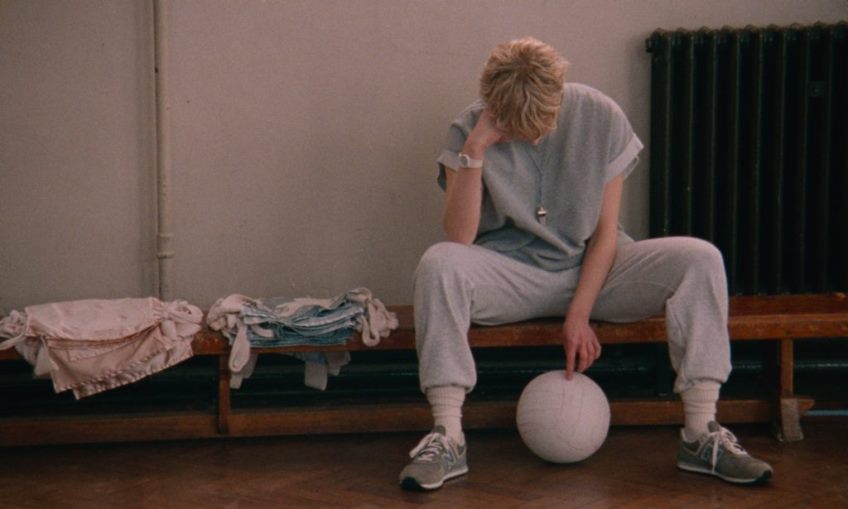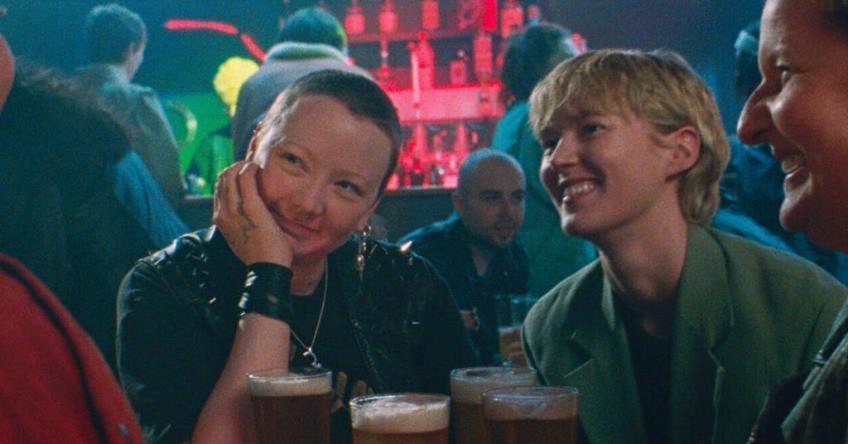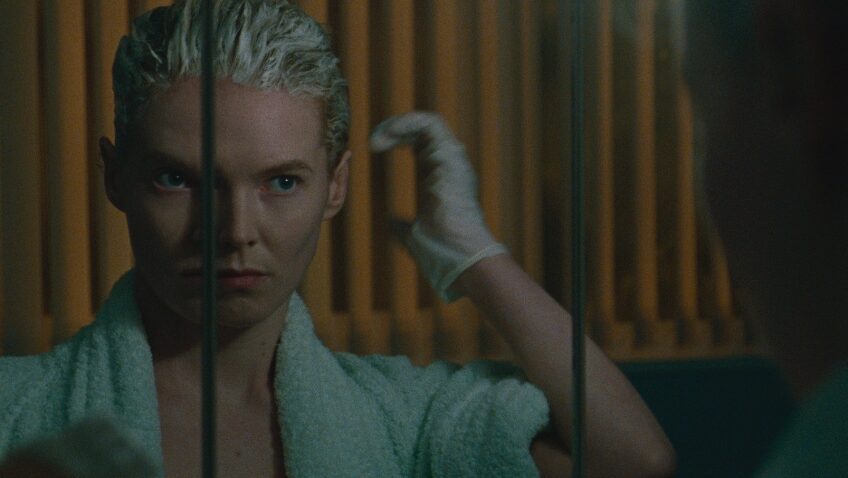Joyce Glasser reviews Blue Jean (February 10, 2023) Cert 15, 97 mins.
Georgia Oakley’s impressive debut feature film not only showcases a couple of talented young actors, but adroitly captures the impact of a piece of misguided English legislation – known as Section 28 – on the life of a PE teacher in Newcastle.
The legislation was repealed 15 years after being passed, but, like the National Default Retirement Act, it was the law long enough to take its toll. Examining the real impact of legislation on an individual is no mean feat and Oakley pulls it off to perfection. Enough so that it should make us gravely concerned about the Retained EU Law Bill that has the potential to affect a much larger percentage of the population than Section 28.
Jean (Rosy McEwen), a very attractive woman in her late twenties with bleached blond hair worn very short, could be a model if she were not a respected PE teacher in a secondary school. Unmarried, but in a close relationship with another woman, Viv (Kerrie Hayes), Jean leads a double life and has to work her way through the relationships in her professional and personal life with care.

It is 1988 and Thatcher’s government is about to pass Section 28 of the Local Government Act that aims to prohibit, “the promotion of homosexuality” by local authorities. It is a law ambiguous but far reaching enough to frighten Jean who works for a local government school and wants to keep her job.
Jean is the soul of discretion. She looks more feminine than androgynous despite the haircut and dresses conservatively. To avoid saying anything suggestive, she says little. She is professional enough to handle the unruly girls in her class in a non-aggressive manner, and she gets along with the teachers, although makes up excuses to avoid socialising with them. She is invited for dinner at her sister’s and babysits for her adorable nephew who adores her. The same cannot be said for her bullying brother-in-law who thinks Jean is a bad influence on his son when he is the problem.
Making her double-life more difficult is the fact that her warm-hearted girlfriend Viv is straight out of central casting, with a butch hairdo, lots of piercings and tattoos, no make-up, and manly/punk clothing. The two maintain separate homes but see one another after work, usually at Jean’s after meeting their friends at a gay bar.
Then one day a new student derails Jean’s delicate balance and lands the teacher in a moral quagmire. Some of the best films ever made have moral dilemmas at their heart and this moral dilemma, which the audience will take on, adds a layer of complexity, humanity and universality to the story. The new girl, Lois (first time actress Lucy Halliday), has issues, and they quickly become intertwined with Jeans’.
Lois is a lesbian and although under-age, shows up at Jean’s club trying to connect in a new city. Jean, uncomfortable at being discovered by this unreadable, and vulnerable student, decides to go home rather than remain and play a round of pool with Lois. Viv is puzzled and suspects Jean is involved with the new student who, with her big-boned structure, fringed brown hair and big blue eyes looks like a Lucien Freud model.

Jean’s problem is whether to remain detached when Lois is baited and bullied by the girls in her class and retaliates, or defend Lois as a witness, and in so doing, risk outing herself and losing the job she loves. ‘I can’t be that person for you,’ Jean tells Lois, after making her decision not to be a witness. What do we owe another person, and is a charitable debt diminished by the personal cost to us of paying it?
Oakley presents the moral debate in such a way that we see it through Jean’s eyes but have to confront it ourselves. The director also has just the right touch in the sex scenes, which are filmed to show the warmth and trust between Viv and Jean, a trust that is tested in an emotional scene in a diner that is a master class for actors, writers and directors.
There’s another cathartic scene when Jean, wearing a flattering dress and shoes, shocks a single guy coming onto her at her sister’s house by informing him of her sexual inclination. Nowadays this would not be awkward in the extreme, but we are in 1988 in the suburbs of Newcastle. Jean leaves the house elated and sits on a wall laughing until tears roll down her cheeks.
Oakley is interested in self-censorship and the interaction between self-betrayal and betrayal. Through Jean’s convincingly drawn relationships the writer-director examines the choices gay people were forced to make because of Section 28, choices that heterosexuals were unaware of. And it is this aspect of the film that makes it more universal and profound than it already is. Not everything in the script is perfect, most disappointingly, the wishy-washy ending when we were waiting for something stronger.
Blue Jean is Rosy McEwen’s breakthrough film, and might remind you of American actress Julia Garner in the wonderful 2015 comedy Grandma, starring Lily Tomlin as troubled Garner’s feisty grandma. McEwen conveys her fear, frustration, confusion, anguish and guilt with her body, her face, and her voice, but always in an understated manner. It’s the acting of a seasoned pro even if the Newcastle-upon-Tyne accent is shaky. Her co-star Kerrie Hayes is a regular on several television series, but, at 35, has found her best role to date here as the person who forces Jean to confront the truth or accept the consequences.




